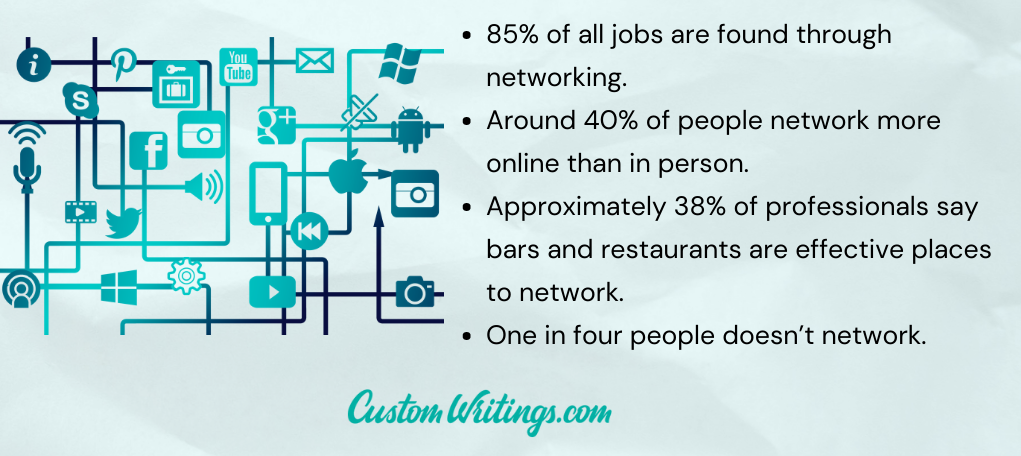Hey everyone! If you don’t remember me, I’m Xiu Zhang. I’ve written a few posts here before, and now, I’m jumping on my favorite horse as you’d say it: networking for college students.
Like I mentioned in my previous posts, I dream of setting up my own company. I know it’s gonna be a difficult journey, that’s why I’m taking my first steps now. And they are called networking.
There’s a very popular saying in China – “A single conversation with a wise man is better than 10 years of study.”
And that’s true: we Chinese people know why networking is important. In fact, it’s a part of our philosophy called guanxi. Let me tell you more about it.
Guanxi: The Power of Networking Moves to the USA
In simple terms, guanxi is a Chinese word meaning “networking,” and it usually refers to the ability of a person to use their social connections for business purposes. Although no exact date is known for the emergence of this term, it appeared in imperial China when a person’s reputation played a greater role than anything legally known. Contrary to popular belief, this networking help is built on trust. Rooted in the Confucian tradition, it is an outstanding strategy to establish social harmony. If you know the right people, they can help you seal the deal with a company you want, and in turn, you will help them as a result.
Although these are my first years in the USA, I have already met many friends realizing the importance of social network for college students. Many of my new friends are from the tech industry.
I have met lots of people as of now. My college hosts many events for my major but also general activities that I see as networking events for college students. During my first week of studying, I met several senior Chinese students who took me on language courses with them and introduced me to some of the college graduates who offer the helping hand to sophomores. Not only did I got a huge amount of resources that improved my studying but I also realized that I’m not alone! As you see, networking helps everyone.
Why Is Networking Important?
Have you ever heard the saying, “You are the average of the five people you spend the most time with”? That’s true!
Networking is a representation of who you are. The people you spend the most time with shape who you are. They determine what conversations require your attention. They affect which attitudes and behaviors you are regularly exposed to.
As Darren Hardy writes in The Compound Effect, “According to research by social psychologist Dr. David McClelland of Harvard, [the people you habitually associate with] determine as much as 95 percent of your success or failure in life.”
You can get almost everywhere in life if you use networking. Students networking can bring them into professional life and guarantee what type of position they gain. It also motivates you a lot: if you spend time with students who don’t fancy studying, you won’t do your best.
Why Do I Network in College? (And You Should Too)
If you still don’t know why is networking important in college so important, here’s a short list for you.
Networking activities for college students help to:
- Meet the necessary people who will help them build the company of their dreams
- Get career suggestions and recommendations
- Meet new people and strengthen their position in any field
- Be among the first people to discover awesome innovations
- Develop new ideas in cooperation with others
- Go from university networking to career networking
- Write a resume or an internship application with the help of the student network.
As you see, student networking is a great opportunity for you to invest in your future.
How Do I Network?
There are many networking tips for college students, but you can search lots of them online or even try out different stuff on your own. I’ve got my own ways to foster networking in college.
- Always be visible on your campus. The top of my networking strategies for college students is being active in my college. I met a lot of people simply because I volunteered to help my professors and participated in many initiatives and event creations that exposed me to many different personalities.
- Add a little bit of fun. You don’t need to do all the boring stuff, you know. You can go to parties and still network. You can join an artistic or literature club and still do it. In fact, entertainment is a great way to find people who think like you. There are many networking event tips for college students you can find based on your interests from how to dress to what types of meals to order.
- Go to job fairs. One of the best ways to network is to put yourself out there as a potential candidate for a hire. If you’re feeling very ambitious, networking business cards for college students are a thing.
- Locate and secure an internship. Networking connections don’t end with what you can find in a uni: you can become an intern in lots of companies and, as a result, you meet both learners and employers that can help you a lot.
- Use social media. Because being online is important, you may think about what social networks do college students use and join them. Write about anything you like; the main thing is to show that you’re an interesting person and you know about your degree.
- Contact with professors. Your educators know how important is networking, and they often invite the students they like to events that can be decisive for their careers. Of course, it can require a little bit more hard work in studying or in assisting your profs, but it will pay off.
- Reach out first, but don’t overdo it. In thinking about how to network, you can get too involved and be, let’s admit it, a little bit annoying if you send emails and call people every day. It can be frustrating to know that you do most of the work at first, but at the same time, give the people some time to miss you.
My Networking Tips even Introverts Will Love
Are you an introvert and don’t know how to get into networking? Here are some networking education tips just for you.
- Have some icebreaker questions. They help you be more prepared in a conversation and be more open, especially if you want to do more networking in university but feel awkward in a conversation. Ask people about anything, for example, about the last movie they saw or their favorite lemonade taste.
- Become a good active listener. Here’s what I learned about networking the hard way: people love to talk and hear themselves do that. If you listen more and add a few words about yourself, everyone will love you.
- Smile and try to seem relaxed. If you’re afraid of social connections, it can be strange, but it’s a nice way out for when you don’t know what to say. Of course, don’t ignore the question, but just by being more comfortable in your own body, you can seem nicer to people who can want to approach you.
- Don’t go alone. A college network consists of more than one person. So, if you’re an introvert, try to find your more open minded friends with you. But even if they are reserved too, that won’t be bad; you can motivate each other!
- Focus on quality, not quantity. If you’re feeling tired because of so many people around you, maintain only the most important relationships. The importance of networks cannot be overlooked, but you have to take care of yourself too.
Networking Books I Recommend
Now that you know why is networking so important, I’ve got a list of books for you to read if you want to get more network advice:
- Never Eat Alone by Keith Ferrazzi
- The Thought Leader Formula by Robin Farmanfarmaian
- Top of Mind by John Hall
- Superconnector by Scott Gerber and Ryan Paugh
- Brave, Not Perfect by Reshma Saujani
- The War for Kindness by Jamil Zaki
- Breathe To Succeed by Sandy Abrams
- Taking the Work Out of Networking by Karen Wickre
- Friend of a Friend by David Burkus







